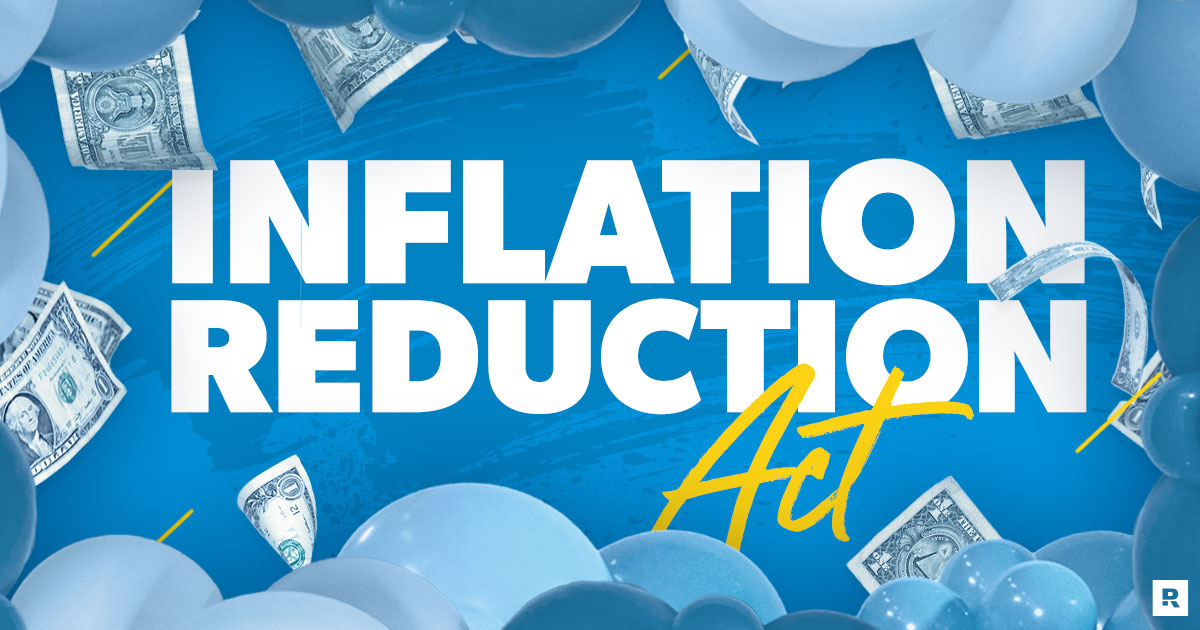What Is the Inflation Reduction Act and How Does It Affect Me?

If you read To Kill a Mockingbird in school, you realized pretty quickly it has nothing to do with shooting songbirds.
The Inflation Reduction Act is kind of the same way. This 730-page bill that President Joe Biden signed into law on August 16, 2022, is about lots of things . . . except reducing inflation.
What Is the Inflation Reduction Act?
The Inflation Reduction Act is a massive climate, health care and tax act. The bill became law in August, but most of its programs won’t start until 2023.
About $369 billion of the Inflation Reduction Act’s $437 billion price tag goes toward climate-related programs. Most of the rest of the spending goes to health care subsidies. And all that money has to come from somewhere, so Congress hopes to fund a big portion of the bill through a new 15% corporate minimum tax.1 (We’ll get to that later.)
So, how will the Inflation Reduction Act affect you? Let’s take a look.
How Does the Inflation Reduction Act Reduce Inflation?
Ugh, inflation sucks, right? Can’t some politicians pass laws to make things go back to normal? Well, politicians can help with inflation (this is called fiscal policy), but getting control of inflation is mostly the job of the Federal Reserve. And the Fed has been raising interest rates to fight inflation.
Taxes shouldn’t be this complicated. Connect with a RamseyTrusted tax advisor.
The Inflation Reduction Act is fiscal policy, but it doesn’t do much to put the brakes on inflation. According to the Congressional Budget Office (CBO), the bill will have “a negligible effect on inflation.”2 Or in other words, it does a big, fat nothing to lower inflation.
Some politicians weren’t happy with the CBO’s statement on the bill. But the CBO isn’t a biased organization with an ax to grind. It’s an objective federal agency that estimates the size of budgets and the impact of legislation. The Inflation Reductions Act’s clever title didn’t fool the number-crunchers at the CBO.
The CBO’s official forecast says the bill could either slightly increase or decrease inflation. This is because the bill’s higher taxes reduce inflation but government spending increases inflation. So it’s kind of a wash.
Decreasing the federal deficit reduces inflation, and the CBO estimates that the Inflation Reduction Act will lower the deficit by $102 billion over the next 10 years.3 So, that’s about $10 billion a year—which is small potatoes when it comes to a deficit that goes up by about a trillion dollars a year.
The bill also aims to slash prescription drug prices for people on Medicare. Sure, that could be seen as a way to reduce inflation on expensive drugs. But this won’t affect inflation as a whole.
How Much Does the Inflation Reduction Act Cost?
Okay, we warned you. The Inflation Reduction Act has a big price tag: $437 billion.4
Just think about how big that number is. If you laid $437 billion worth of dollar bills end to end, it would circle the globe 1,700 times. That’s a lot of cash!
In fact, with $437 billion, you could cover a 30-lane highway in dollar bills around the entire earth and have some cash left over to buy electric cars for about 150,000 of your closest friends. But if you skipped the paper highway, you could buy a $60,000 electric car for 7.3 million of your friends.
Or you could pay for a climate and health care bill.
Will the Inflation Reduction Act Save Me Money?
About $369 billion of the Inflation Reduction Act’s price tag goes to climate and clean energy policies, which makes it the largest climate bill ever passed. The goal of these policies is to cut greenhouse gas emissions by 40% by 2030.5
And some of these climate policies, along with the health care portions of the Inflation Reduction Act, are designed to save Americans money. Here are some of the specific programs:
Electric Vehicle Tax Credits
The bill’s Clean Vehicle Credit offers a $7,500 tax credit to people who buy new electric vehicles. But before you go out and test-drive a new Tesla, take a look at these conditions to see if you qualify for the credit (you have to meet both criteria):
- Your annual taxable income must be less than $150,000 if you’re single or $300,000 if you’re married.
- The manufacturer’s suggested retail price must be less than $55,000 for cars and $80,000 for trucks, SUVs and vans.6
The bill’s electric vehicle guidelines went into effect immediately, but because of price and assembly restrictions, about 70% of electric vehicles that are currently for sale aren’t actually eligible.7 That stinks, right? But, hey, you might have better luck buying a used electric car.
We always recommend buying a used car instead of a new car because a new car loses somewhere between 9% to 11% of its value as soon as you drive it off the lot.8 And keep in mind—the total value of things you own with wheels and engines shouldn’t be more than half of your annual income.
And good news: The Inflation Reduction Act also offers a 30% credit (up to $4,000) on the purchase price of a used electric vehicle. But this credit has some narrow guidelines:
- Your taxable income must be less than $75,000 if you’re single or $150,000 if you’re married.
- The sales price of the vehicle must be less than $25,000.
- The vehicle must be at least two years old.9
You have some time to shop around because the used electric vehicle guidelines don’t take effect until January 1, 2023. The electric vehicle tax credit is nonrefundable, which means it reduces your tax bill, but you won’t get a refund for the difference if the credit is more than your total bill.
If you decide to buy a new vehicle, make sure it qualifies for the credit. By 2024, half of a new vehicle’s battery components have to be manufactured in North America to qualify for the credit, and this could further cut down on the vehicle models that qualify.10
Home Energy Credits
The Inflation Reduction Act includes tax credits and rebates for people who buy energy-efficient or electric appliances and home upgrades. And on top of saving you money on your taxes, these improvements will cut the cost of your utility bills.
Here are some of the tax credits available:
- 30% of the cost of a geothermal heating system
- 30% of the cost of rooftop solar panel and battery storage installation
- 30% of the cost of the installation of a heat pump or a heat pump water heater (up to $2,000)
- 30% of the cost of electric panel upgrades (up to $600)
- 30% of the cost of insulation, ventilation and sealing (up to $1,200)11
For those with low incomes (80% or less than the median income in the area), the bill will provide rebates (in the form of up-front discounts) on many appliances that cut down energy bills.12 These rebates will be handled at the state level beginning in 2023. Here are some of the rebates that will be available:
- Up to $8,000 for heat pump installation
- Up to $1,750 for a heat pump water heater
- Up to $840 for electric stove
- Up to $840 for electric dryer
- Up to $4,000 for upgraded breaker box
- Up to $1,600 for insulation, ventilation and sealing
Moderate-income households will qualify for a 50% rebate of the costs of these items.13
Listen, we’re always in favor of saving money, and tax credits and rebates aren’t a bad thing. But don’t run out and buy solar panels or a new heat pump just to get the tax credit. In fact, don’t do anything with your money just to get a break on your taxes. It doesn’t make sense to spend money just to save money, especially if you weren’t planning to spend that money in the first place.
Cheaper Prescription Drug Prices
Prescription drug prices are seriously out of control. So the Inflation Reduction Act is trying to do something about that. It sets a $2,000 cap for out-of-pocket prescription costs for Medicare recipients starting in 2025. And beginning in 2023, out-of-pocket insulin costs will be capped at $35 a month.14
The bill also expands Medicare’s ability to negotiate prices for expensive drugs directly with pharmaceutical companies. And companies that raise prices higher than the rate of inflation will have to issue rebates.15
Congress expects these measures to save the government $265 billion over 10 years.16
Health Care Support
The Inflation Reduction Act includes $64 billion to help cover premiums for people who have health care coverage under the Affordable Care Act. The aid adds up to an average of $800 per year for people whose income is below 400% of the federal poverty line.17
The aid will last until 2025 and is an extension of the American Rescue Plan Act that was set to expire.
Will the Inflation Reduction Act of 2022 Raise Taxes?
So, how does Congress plan to pay for this bill? Well, the answer is by raising taxes. (Saw that one coming from a mile away, didn’t you?)
The Inflation Reduction Act puts in place a 15% corporate minimum tax on large corporations with more than $1 billion in annual earnings. The tax is expected to net Uncle Sam about $222 billion over 10 years. About 150 of America’s largest companies will have a higher tax bill starting in 2023.18
There will also be a 1% tax on corporate stock buybacks that’s expected to bring in another $126 billion.19 A stock buyback is when a company buys shares of its own stock to boost the share price for its investors. Think of it as a company investing its profits into itself.
The bill also authorizes the government to spend $80 billion to modernize the IRS and double the size of its workforce.20 Yep, the big bad IRS is going to get bigger . . . and badder. Politicians could have labeled the Inflation Reduction Act the Build Back the IRS Act, but that would have gone over like a lead balloon because nobody likes the KGB—whoops, IRS.
With its army of new employees, the IRS will be able to conduct more audits and collect more unpaid taxes—for a total of more than $200 billion in additional revenue over the next 10 years.21
But get this, President Biden said that no one who earns less than $400,000 will get hit with higher tax bills or additional audits. And we all know politicians always keep their word, right?
According to the Senate Joint Committee on Taxation, taxes will increase by an average of 0.8% for taxpayers earning $50,000 to $75,000 in 2023, but that number will move closer to zero in the years that follow.22
Sure, the Inflation Reduction Act might not outright increase taxes for everyday people, but it will end up taxing us all in a roundabout way. That’s because corporations normally pass taxes along to consumers and employees.
How you ask? Well, the companies that get hit with the corporate minimum tax will most likely pay lower wages to their employees. And their stock values will go down, which will affect the value of millions of retirement accounts. Yep, so in an ironic twist, the Inflation Reduction Act (IRA) has more of an effect on Individual Retirement Accounts (also IRA) than on inflation.
Many of the Inflation Reduction Act’s estimates for spending and revenue cover a range of 10 years. As time goes on, states will also figure out their tax rebate programs for appliances and other energy upgrades.
Work With a Tax Pro
Phew, that was a lot. Hey, we know legislation can get confusing pretty fast—especially when it comes to taxes. But through our Endorsed Local Providers (ELP) program, you can find a true pro to handle it all. There are RamseyTrusted tax advisors in your area who’ll do whatever it takes to help you win with taxes.
Source link





